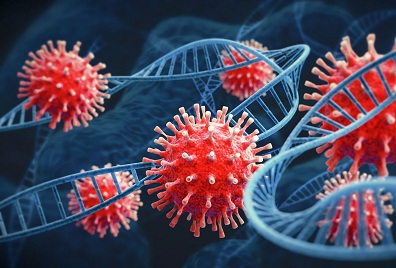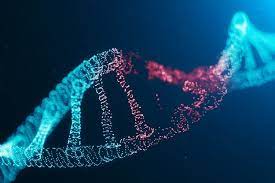BREAKING! University Of Vermont Scientists Confirms That SARS-CoV-2 Has Ability To Damage Human DNA And Telomeres Causing Long COVID Issues
Source:Long-COVID News Sep 14, 2021 4 years, 3 months, 1 week, 4 days, 5 hours, 20 minutes ago
Long-COVID News: Scientists from the University of Vermont-USA along with support from researchers from Duke University School of Medicine-North Carolina-USA have in a new study confirmed that the SARS-CoV-2 coronavirus has the ability able to cause damage to the DNA and telomeres of the human host. The study findings has alarming implications in terms of long term medical conditions and also helps reason for some of the Long COVID manifestations.

The SARS-CoV-2 coronavirus responsible for the current COVID-19 pandemic that has now infected more than 227 million individuals and caused more than 4.65 million COVID-19 deaths globally according to unreliable official figures (Realistic figures could be as high as eight fold!), is now causing more alarm among physicians and researchers as there seems to be an ever increasing rise in the variety of ailments and medical conditions in those that have been deemed as ‘recovered’ from COVID-19, what is now being termed as Long COVID or Post-Acute Sequelae of COVID-19 (PASC).
More emerging data and
Long-COVID News suggest that symptoms and general malaise may continue long after the infection has ended in recovered patients, suggesting that SARS-CoV-2 infection has profound consequences in the human host cells.
The study team reports that SARS-CoV-2 infection can trigger a DNA damage response (DDR) in African green monkey kidney cells (Vero E6).
The team observed a transcriptional upregulation of the Ataxia telangiectasia and Rad3 related protein (ATR) in infected cells.
Furthermore, the study team also observed enhanced phosphorylation of CHK1, a downstream effector of the ATR DNA damage response, as well as H2AX. Strikingly, SARS-CoV-2 infection lowered the expression of TRF2 shelterin-protein complex, and reduced telomere lengths in infected Vero E6 cells.
Hence the study findings suggest SARS-CoV-2 may have pathological consequences to human host cells beyond evoking an immunopathogenic immune response.
The study findings were published on a preprint server and are currently being peer reviewed.
https://www.biorxiv.org/content/10.1101/2021.09.08.459535v1.full.pdf
The study findings confirm that SARS-CoV-2 may have consequences to human host cells beyond evoking an immune response!
Most RNA viruses, such as SAR-CoV-2, are renowned for activating the DNA damage response (DDR) pathway and inducing DNA damage due to their replication cycle within host cells. The signaling pathways ataxia-telangiectasia mutated (ATM), ataxia-telangiectasia and RAD3-related (ATR), and DNA protein kinase (DNA-PK) mediate the DDR. The DDR pathway functions as a crucial part of an intracellular defense system that activates when lesions are detected on the DNA to aid in the repairing of damaged DNA.
It is important to note that when there is a failure in DNA repair, apoptosis is induced, or DNA damage tolerance or translesion synthesis (TLS) is activated, which permits the cell's survival even though DNA damage is present.
gt;
The study team examined the ability of SARS-CoV-2 to impact DNA damage response and telomere stability in Vero E6 cells.
For the study, Vero E6 cells were infected with SARS-CoV-2 and incubated for 48 hours before further downstream processing. The Vero E6 cells were incubated for 10 minutes with RLT buffer containing 2-Mercaptoethanol, to extract the RNA from the infected cell lysates.
The study team then harvested RNA and subjected it to quantification via the Nanodrop 2000. (A ThermoFisher spectrophotometer). Then it was diluted until the concentration of RNA was 10ng/µl in each sample. Quantitative reverse transcriptase-polymerase chain reaction (RT-qPCR) was then performed. Telomere lengths were then measured using primers that detect telomeric repeats.
 DNA Damage
DNA Damage
The study finding showed that following the infection with SARS-CoV-2, the ATR DDR was activated. A substantial increase in the transcription expression of ATR and checkpoint kinase 1 (CHK1), the downstream effector molecule of ATR, and elevated phosphorylation of CHK1 protein, indicated activated ATR DDR. Within infected cells, there was no increase of the total ATR protein levels or phosphorylation of the ATR protein, which suggests the comprehensive elevation in ATR levels corresponding to the elevated mRNA levels could have materialized before the 48-hour testing time.
Furthermore the levels of CHK1 protein and total ATR were observed to be reduced at 48 hours.
Significantly H2AX phosphorylation protein was also observed to increase, despite an insufficient increase in ATM transcript expression. It was concluded that the ATR DDR pathway is activated in host cells when a SARS-CoV-2 infection occurs, which may impart an unknown proliferation potential to its infectious cycle.
Past studies have shown that breaks in the host double-strand DNA drive ATR activation with retroviral infections such as HIV during viral DNA integration, which leaves single-strand gaps. Infectious bronchitis virus (IBV), an RNA virus of the same family as SARS-CoV-2, has been shown to manipulate the ATR DDR to propel their infection cycle.
https://pubmed.ncbi.nlm.nih.gov/16306615/
https://pubmed.ncbi.nlm.nih.gov/21779911/
Alarmingly as well, it was observed that within 48 hours, the telomere lengths within SARS-CoV-2 infected cells had relatively shortened compared with the uninfected control cells. Also, the expression of TRF2, which functions to protect telomers, was significantly suppressed in the SARS-CoV-2 infected cells.
The study findings has enormous and alarming implications on the future medical and health conditions of so called “recovered” SARS-CoV-2 infected individuals. It is now becoming vital that the pathobiological consequences in recovered patients are studied, especially with the continuous emergence of new strains.
The study findings confirms that SARS-CoV-2 infections are affects telomere function and triggers ATR DDR, which are closely associated with genome stability in human host.
To date there are no known therapeutics to treat Long COVID or PASC, Thailand Medical News is working with research teams across the world to develop a new line of nano-technology based phytochemicals involving polyphenols, organosulfur/organoselenium compounds, indoles, sesquiterpene lactones, ursolic acid and anacardic acid with a key focus epigallocathecin gallate, carvacrol, galangin, limonene, lycopene, naringin, puerarin, terpinene and thymol.
We highly recommend that in the meanwhile, individuals start low doses of Oregano Oil, Quercetin and Skullcap supplements.
Only stick to brands such as Vitaly Works, North American Herb & Spice, Natural factors, Solaray, Gaia Herbs, Thorne Research, Doctor’s Best and Natures Way. Be careful as many American, British and Thai supplement brands are simply peddling inferior or sub-standard products, hence we recommend readers to only stick to the above brands. (We do not have any business interest with any of these brands nor do we receive any monies from any of these brands.)
For more
Long-COVID News, keep on logging to Thailand Medical News.

